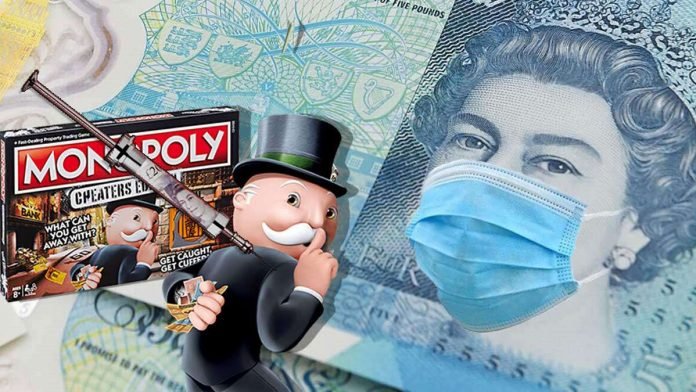Coronavirus has brought us pain, death and misery as well as the biggest transference of public money ever pumped into private hands.
Top shareholders at Pfizer and Moderna made more than £7.8billion ($10billion) in stocks growth in the week after the discovery of Omicron.
In the first week that the Omicron variant sparked global fears of a new wave of infections, a small handful of investors and executives with Pfizer and Moderna—currently the world’s preeminent makers of Covid-19 vaccines—saw over £8 Billion in new wealth, with the Moderna’s CEO alone adding over £800 million to his personal fortune. Shares in the pharmaceutical giants rose by 7.4 per cent and 13.6 per cent respectively in the seven days to November 30 —
Based on data compiled by Global Justice Now and released Saturday, “just 8 top Pfizer and Moderna shareholders” added a combined £8 billion to their fortunes last week after stock prices soared in response to the emergence of Omicron. According to a statement by the group:
Moderna’s shares skyrocketed after the announcement and settled at £234.74/share on Wednesday 1 December, up 13.61% from £205.95 /share since Wednesday 24 November, the day before the announcement. Pfizer’s shares rose by 7.41% from £38.36/share to £41.20/share.
Moderna’s CEO, Stephane Bancel, personally made just under $623m in the one week after the announcement, with the value of his shares rising from £4,561,332,629.30 to $5,181,292,409.49. He sold off 10,000 shares for £240.38 each on 26 November, the day after the variant was announced, cashing out £2.40 million.
At the close of business last Tuesday, Bancel’s shares had grown by £1.2 billion since the announcement, before falling after the company lost a legal dispute over patents.
Private hands that are not willing to share the vaccine we paid for.
Bancel has refused to share the recipe for Moderna’s vaccine with the World Health Organisation to help scale-up manufacturing of mRNA vaccines through its new hub in South Africa. WHO scientists are now trying to reverse-engineer the vaccine. His company is also waging a legal battle to erase the role of massive public funding and public scientists in developing the jab.
With nations in the European Union, the United Kingdom, and others continuing to block a demand for a vaccine patent waiver at the World Trade Organization, public health campaigners have hammered government leaders for doing the bidding of the pharmaceutical industry. Anger has become especially harsh because the emergence of new and dangerous variants was predicted as the likely outcome if nations did not move swiftly to vaccinate the world by making shots universally available.
“Pharmaceutical companies knew that grotesque levels of vaccine inequality would create prime conditions for new variants to emerge. They let Covid-19 spread unabated in low and middle-income countries.”
Tim Bierley
“Pharmaceutical companies knew that grotesque levels of vaccine inequality would create prime conditions for new variants to emerge,” said Tim Bierley, pharma campaigner at Global Justice Now. “They let Covid-19 spread unabated in low and middle-income countries. And now the same pharma execs and shareholders are making a killing from a crisis they helped to create. It’s utterly obscene.”
“At every turn,” he continued, “these companies have obstructed efforts to more equitably distribute vaccines around the world. They have made more than enough money from the pandemic, selling two of the most lucrative drugs in history. It’s time to hand over the recipe for these essential medicines to the WHO so we can finally end this pandemic.
Campaigners are calling on the government to break Pfizer’s monopoly on the publicly-funded vaccine, to increase global access to Covid-19 vaccinations and save the NHS huge sums of money, which can be reinvested in frontline staff.
It comes ahead of the World Trade Organisation’s ministerial conference, where governments will discuss waiving intellectual property on Covid-19 vaccines and treatments, which would allow generic manufacturers to produce the Pfizer-BioNTech vaccine at a lower price.
More than 130 countries including the United States support a waiver, which was first proposed by India and South Africa last October. But the British and German governments have blocked progress so far.
While a scheduled decision on the WTO patent waiver was postponed last week, progressives worldwide have insisted that there will be no end to the global pandemic until vaccine apartheid is brought to an end.
Nobel economist Joseph Stiglitz and trade expert Lori Wallach argued in an op-ed last week that the pandemic cannot be defeated until the waiver is approved.
“As the Omicron variant shows, as long as there are raging outbreaks anywhere, Covid-19 will mutate and the possibility of more infectious or deadly strains increases,” the pair wrote. “That’s why, unless people everywhere are vaccinated, we face the prospect of an endless pandemic.”
When the “underlying problem is a lack of global supply,” they argued—and more vaccines and boosters will be needed to fend off variants—the WTO waiver “is an obvious way of increasing supply and helping put an end to the pandemic for good.”
And as Bierley said, “It’s long past time for the UK and the EU to stand on the side of global health instead of vaccine billionaires—and get behind an intellectual property waiver on Covid-19 vaccines, tests, and treatments.”
Who made the most money after the emergence of Omicron out of Pfizer’s shareholders?
Vanguard Group Inc £1.3billion
Blackrock Inc £1.1billion
State Street Corp £831million
Capital World Investors £687million
CEO: Albert Bourla £256,392
Total: 3.9billion
Who made the most money after the emergence of Omicron out of Moderna’s shareholders?
Baillie Gifford & Co £1.2billion
Vanguard Group Inc £763million
Blackrock Inc £755million
Flagship pioneering £494million
CEO: Stephane Bancel £623million
Total: £3.9billion
The UK is one of a handful of governments blocking international efforts to ramp up vaccine production and drive down drug prices by waiving intellectual property rules on coronavirus vaccines and treatments for the remainder of the pandemic.

Pfizer has extracted nearly £2 billion in profits from the NHS for its vaccine, more than six times the total amount the government has spent on a pay rise for nurses who have worked through the Covid-19 pandemic.
Campaigners have slammed the government for reinforcing a system of intellectual property rules that allows companies like Pfizer to use a publicly-funded vaccine to siphon off money needed to pay frontline staff.
Former Prime Minister Gordon Brown last week claimed rich nations not sharing vaccines with the rest of the world is now ‘coming back to haunt us’ with the emergence of variants.
The NHS has paid £2.57 billion to Pfizer for 100 million doses of Covid-19 vaccine, with a £1.903 billion mark-up above production cost.
The eye-watering profit margin is more than six times what ministers have allowed NHS England to spend on pay rises for nurses this year, which has totalled just £302 million.
The Pfizer-BioNTech vaccine received £2.5 billion in public funding, mostly from the German and American governments, but the company has been allowed to demand huge profits from healthcare systems around the world.
Pfizer’s vaccine costs just £4.94 to produce, but it has charged the NHS £18 a dose for the first 100 million purchased and £22 a dose for the next 35 million, totalling £2.57 billion.
At £4.94 per dose, the 135 million doses sold to the NHS will have cost Pfizer £666.9 million, meaning the company has charged the NHS a £1.903 billion mark-up.
Despite demands from their union of a 12.5% pay rise, the government would only grant a 3% rise to nurses who have worked in gruelling conditions throughout the pandemic. After inflation, the £1,000.52 annual increase is effectively a pay cut.
The surplus paid to Pfizer could fund the 12.5% rise demanded by unions which would cost £1.26 billion, 1.5 times over.
Support Independent Journalism Today
Our unwavering dedication is to provide you with unbiased news, diverse perspectives, and insightful opinions. We're on a mission to ensure that those in positions of power are held accountable for their actions, but we can't do it alone. Labour Heartlands is primarily funded by me, Paul Knaggs, and by the generous contributions of readers like you. Your donations keep us going and help us uphold the principles of independent journalism. Join us in our quest for truth, transparency, and accountability – donate today and be a part of our mission!
Like everyone else, we're facing challenges, and we need your help to stay online and continue providing crucial journalism. Every contribution, no matter how small, goes a long way in helping us thrive. By becoming one of our donors, you become a vital part of our mission to uncover the truth and uphold the values of democracy.
While we maintain our independence from political affiliations, we stand united against corruption, injustice, and the erosion of free speech, truth, and democracy. We believe in the power of accurate information in a democracy, and we consider facts non-negotiable.
Your support, no matter the amount, can make a significant impact. Together, we can make a difference and continue our journey toward a more informed and just society.
Thank you for supporting Labour Heartlands












